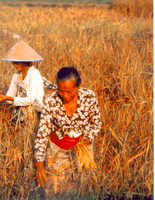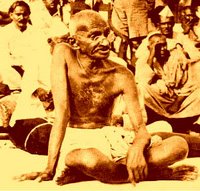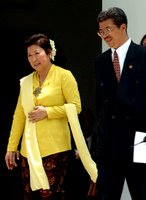
Chinese-Indonesians, for so long, have been discriminated against in their own country of birth. Evi Mariani, a Chinese-Indonesian herself, explains that its time to claim equal rights as citizenship.
Time for Chinese-Indonesian to claim equal rights as citizenship
Evi Mariani, Jakarta, May 22, 2006
(The writer is a journalist at The Jakarta Post)
I am a Chinese-Indonesian, a member of the minority. But on top of that, I am an Indonesian. I am proud to be one despite the rampant corruption that has tainted the nation’s image.
For a person of Chinese descent like me, however, having the word Indonesian attached to my identity is not a matter of birthright. My family had to struggle to obtain our Indonesian status.
Indonesian citizenship is not a coveted status, to be honest. But we have nowhere to go. Tracing up the family tree, six out of my eight grandparents were born here.
As people of Chinese descent, my father and mother had to present legal evidence in the 1960s that they were Indonesians. At that time many Chinese-Indonesians fell victim to forged citizenship documents, including my father. He realized he had no valid documents after he married my mother in 1970.
Under Indonesia’s paternalistic legal system, all their children consequently had no citizenship, due to my father's fake papers. My mother, on the other hand, had valid papers.
To make a long story short, they faked a divorce just before their first child’s birth. They have four children. I am the third. We all have birth certificates saying that we are children born out of wedlock to a Chinese-Indonesian woman. That way, we legally became Indonesians, and legally became fatherless.
Just having citizenship documents, though, is apparently not enough for Chinese-Indonesians.
On the street, in public places, at school, some of us occasionally have the misfortune of having to prove that we are Indonesians.
So we try to keep a low profile in traffic and in public places. We don’t fight back. We give more money than anyone else every Independence Day, and we give bribes every time the authorities ask. In a nutshell, we don’t want trouble. We have seen how a traffic accident involving a Chinese person can set a city on fire.
Besides having nowhere else to go, many of us have somehow developed an acquired taste for being Indonesian after seeing both the dark and the bright side.
My parents in Bandung, West Java, have experienced at least three anti-Chinese riots: in the 1960s, in the 1970s and in 1998.
We have seen the ugly, racist face of Indonesians. But we have also seen the kind face. What my parents mostly recall about the 1970s riot was hiding their toddlers under the bed, with their hearts pounding. They also remember a savior. He was a neighbor my father called Pak Haji (signifying someone who has done the hajj), who stood in front of our house and told the rioters and looters not to touch those “kind Chinese folks.”
Perhaps unwittingly, at the end of the day we choose to forget the ugly faces and remember the kind-hearted people instead.
I grew up believing in a multicultural Indonesia. I believe in the kind-hearted people who work at respecting differences. Spending my university years in Yogyakarta, an exemplary home to multiculturalism, only confirmed my belief.
So strong is that belief that the horrible 1998 riot did not dampen it. Instead, I saw Chinese-Indonesians overcome their fear and actually do things to fix the situation. Many of them timidly became more open, more involved. Some Chinese-Indonesians formed organizations which encourage their members to be more open.
In times of riot and trauma, we manage to look up and find the silver lining. Instead of clouds, I see the sun on the horizon.
But the news from Makassar, where last week students threatened to target Chinese-Indonesians, made me think again. I have probably been over-confident about the state of multiculturalism.
One student, Ibnu Hajar, told reporters: “They (Chinese-Indonesians) are newcomers, but they act how they like toward locals.”
I thought Chinese-Indonesians would never have to be called newcomers anymore. New what? Coming from where?
Not only in Makassar, but even in Jakarta, we still have to put up with the word Cina uttered not in a friendly tone but with suspicion. For example, my neighbor (he is the head of the neighborhood unit) once mentioned his disappointment about having a Chinese-Indonesian neighbor to my housemate.
A middle-rank police officer in Jakarta once told me he preferred pribumi (native) corruptors to Chinese-Indonesian corruptors.
Considering these prejudices, many of us have reason to put high fences around our houses. We have reason to be exclusive. Not that poor and middle-class Chinese-Indonesians like myself can afford exclusivity. Only the wealthy, just like rich people from other ethnic groups, can be exclusive.
But the government and the majority only seem to make half-hearted efforts to change our role as the scapegoats people blame every time they feel an economic pinch.
There has been no serious effort to rehabilitate our name in the history books. Just like any ethnic group in this diverse country, we’ve had our traitors, but we’ve also had our national heroes in the struggle against colonialism.
In my justified anger, I am telling you: as a group, we Chinese-Indonesians have collectively done a lot, given our limitations as a minority. We want a peaceful multicultural country where we can be equal Indonesians, and we have been working on it.
We have hunkered down for years. It is time for the minority to stand up and tell the government and the majority: we have done our part. And we want you to do yours…

















